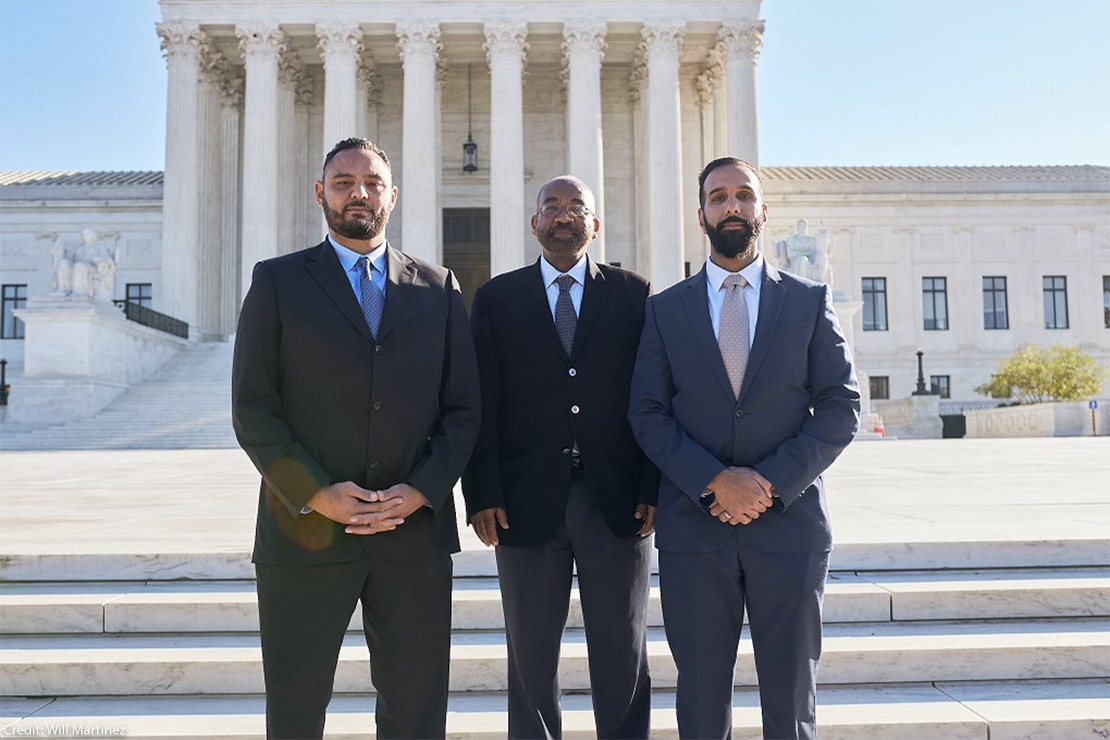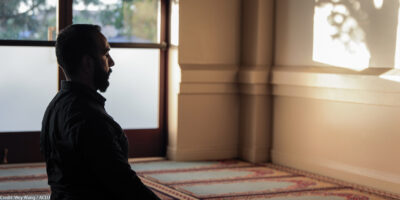
FBI v. Fazaga
What's at Stake
In a case scheduled to be argued before the U.S. Supreme Court on November 8, 2021, three Muslim Americans are challenging the FBIÔÇÖs secret spying on them and their communities based on their religion, in violation of the Constitution and federal law. In what will likely be a landmark case, the plaintiffs ÔÇö Yassir Fazaga, Ali Uddin Malik, and Yasser Abdelrahim ÔÇö insist that the FBI cannot escape accountability for violating their religious freedom by invoking ÔÇ£state secrets.ÔÇØ The plaintiffs are represented by the Center for Immigration Law and Policy at UCLA School of Law, the └¤░─├┼┐¬¢▒¢ß╣¹ of Southern California, the └¤░─├┼┐¬¢▒¢ß╣¹, the Council for American Islamic Relations, and the law firm of Hadsell Stormer Renick & Dai.
Summary
The case stems from an FBI operation in 2006 and 2007 in which agents sent a paid informant to some of the largest, most diverse mosques in Orange County, California and instructed him to pose as a convert to Islam.
The FBI informant indiscriminately gathered names, telephone numbers, and email addresses, as well as information on the religious and political beliefs of hundreds of Muslim Americans who were exercising their constitutional right to religious freedom. The informant repeatedly recorded conversations to which he was not a party ÔÇö including religious prayer groups in the mosque sanctuary ÔÇö by leaving behind a secret recording device hidden in his car key fob. He also video-recorded sensitive locations, including mosques, homes, and businesses using a hidden camera. His FBI handlers told him they were conducting electronic surveillance in at least eight area mosques, including plaintiff FazagaÔÇÖs office. Community members ultimately became so concerned about the informantÔÇÖs behavior that they reported him to the FBI.
ÔÇ£As the Imam of the Orange County Islamic Foundation, I worked diligently to establish trust between my community and the U.S. government after the horrifying attacks of September 11 more than 20 years ago. I invited the FBI to speak with the members of my Mosque. They looked us all in the eyes and assured us unequivocally that they were not spying on us. We trusted them. But they lied, and our sacred community was shaken to its core,ÔÇØ said Sheik Yassir Fazaga, a religious leader and one of the plaintiffs in the lawsuit. ÔÇ£I hope and pray the Supreme Court will allow us to hold them accountable for treating people who practice Islam as second-class citizens.ÔÇØ
After the plaintiffs ÔÇö a religious leader and two congregants ÔÇö filed suit, the District Court for the Southern District of California dismissed their claims that the FBI unlawfully targeted Muslim community members for surveillance based on their religion, accepting the FBIÔÇÖs argument that further proceedings could reveal state secrets. The Ninth Circuit Court of Appeals disagreed, instructing the district court to consider the plaintiffsÔÇÖ religious discrimination claims under procedures mandated by Congress in the Foreign Intelligence Surveillance Act (FISA), which specifies how courts should handle sensitive evidence in cases involving surveillance conducted for national security purposes.
The FBI appealed from this ruling, arguing that its invocation of the state secrets privilege barred the plaintiffsÔÇÖ religious discrimination claims, and the Supreme Court agreed to hear the case.
Legal Documents
-
03/04/2022
Supreme Court Opinion -
10/23/2021
Reply of Respondents Paul Allen, Kevin Armstrong, and Pat Rose -
10/21/2021
Reply of Petitioners FBI, et al. -
10/21/2021
Reply of Respondents J. Stephen Tidwell and Barbara Walls -
09/28/2021
Amicus Brief of Constitutional Accountability Center -
09/28/2021
Amicus Brief of Professor Barry Siegel -
09/28/2021
Amicus Brief of Free Speech Defense & Education Fund -
09/28/2021
Amicus Brief of Constitutional Law Professors -
09/28/2021
Amicus Brief of The Brennan Center for Justice, Due Process Institute, Electronic Privacy Information Center, FreedomWorks Foundation, and TechFreedom -
09/28/2021
Amicus Brief of Asian Americans Advancing Justice-Asian Law Caucus, et al. -
09/28/2021
Amicus Brief of James Dempsey, Sharon Bradford Franklin -
09/28/2021
Amicus Brief for Project for Privacy & Surveillance -
09/28/2021
Amicus Brief of 50 Religious Organizations -
09/28/2021
Amicus Brief of Electronic Frontier Foundation -
09/21/2021
Opposition Brief of Respondents Yassir Fazaga, et al. -
08/06/2021
Amicus Brief of Professor Laura K. Donohue -
07/30/2021
Joint Appendix Fazaga v. FBI -
07/30/2021
Opening Brief of Respondents J. Stephen Tidwell and Barbara Walls -
07/30/2021
Opening Brief of Respondents Paul Allen, Kevin Armstrong, and Pat Rose -
07/30/2021
Opening Brief of Petitioners FBI, et al. -
05/11/2021
Reply of Petitioners FBI, et al. in support of the petition -
04/21/2021
Brief of Respondents Yassir Fazaga, et al. in opposition to the petition -
12/17/2020
Petition for a Writ of Certiorari by FBI, et al.
Date Filed: 03/04/2022
Court: Supreme Court (Cal.)
Date Filed: 10/23/2021
Court: Supreme Court (Cal.)
Date Filed: 10/21/2021
Court: Supreme Court (Cal.)
Date Filed: 10/21/2021
Court: Supreme Court (Cal.)
Date Filed: 09/28/2021
Court: Supreme Court (Cal.)
Date Filed: 09/28/2021
Court: Supreme Court (Cal.)
Date Filed: 09/28/2021
Court: Supreme Court (Cal.)
Date Filed: 09/28/2021
Court: Supreme Court (Cal.)
Date Filed: 09/28/2021
Court: Supreme Court (Cal.)
Date Filed: 09/28/2021
Court: Supreme Court (Cal.)
Date Filed: 09/28/2021
Court: Supreme Court (Cal.)
Date Filed: 09/28/2021
Court: Supreme Court (Cal.)
Date Filed: 09/28/2021
Court: Supreme Court (Cal.)
Date Filed: 09/28/2021
Court: Supreme Court (Cal.)
Date Filed: 09/21/2021
Court: Supreme Court (Cal.)
Date Filed: 08/06/2021
Court: Supreme Court (Cal.)
Date Filed: 07/30/2021
Court: Supreme Court (Cal.)
Date Filed: 07/30/2021
Court: Supreme Court (Cal.)
Date Filed: 07/30/2021
Court: Supreme Court (Cal.)
Date Filed: 07/30/2021
Court: Supreme Court (Cal.)
Date Filed: 05/11/2021
Court: Supreme Court (Cal.)
Date Filed: 04/21/2021
Court: Supreme Court (Cal.)
Date Filed: 12/17/2020
Court: Supreme Court (Cal.)
-
02/28/2019
Ninth Circuit Amended Opinion and Order Denying Petition for Rehearing En Banc
Date Filed: 02/28/2019
Court: Appeals Court (9th Cir.)
-
08/14/2012
District Court Order Concerning the State Secrets Privilege -
08/14/2012
District Court Order Concerning the FISA Claim -
09/13/2011
First Amended Complaint
Date Filed: 08/14/2012
Court: District Court (C.D. Cal.)
Date Filed: 08/14/2012
Court: District Court (C.D. Cal.)
Date Filed: 09/13/2011
Court: District Court (C.D. Cal.)
Press Releases
Supreme Court Allows Suit Against F.B.I. for Spying on Muslims to Move Forward
Muslim Americans File Supreme Court Brief Challenging Religious Discrimination in FBI v. Fazaga
